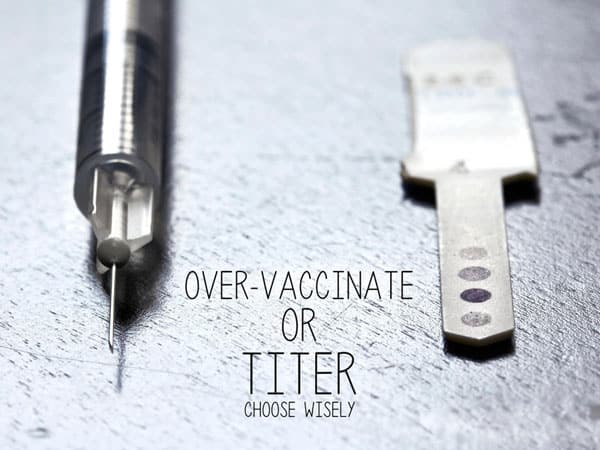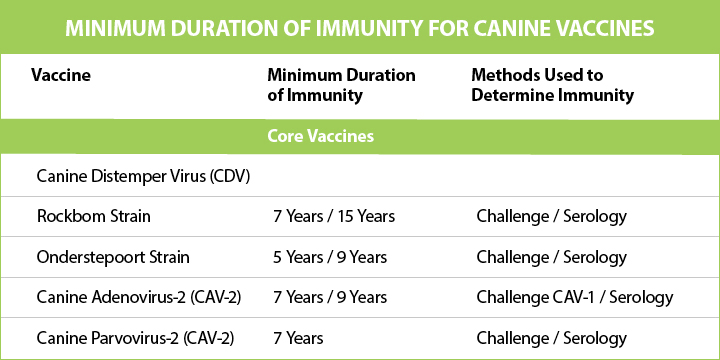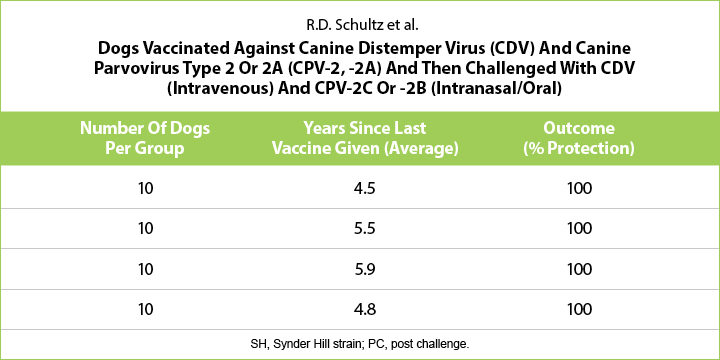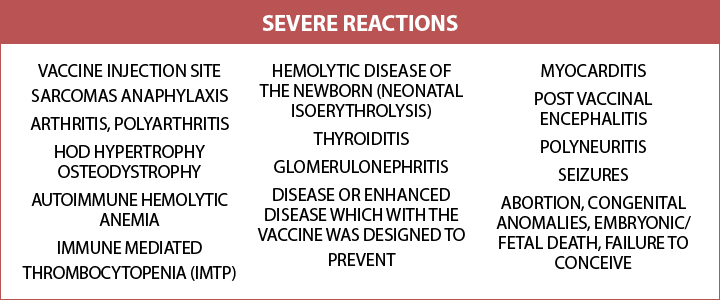Overview Annual Dog Vaccination Dangers
Overview of the Dangers of Annual Dog Vaccinations
I wrote to the BVA British Veterinary Association, for clarification on core vaccines, They wrote back to me in 2014 stating the following.
“The duration of immunity (DOI) for each medicine or product is different and veterinary surgeons must keep up to date with this information.” In 2010 the Veterinary Medicines Directorate (VMD) wrote a letter to the two major veterinary publications Veterinary Record and Veterinary Times, explaining that recent trends in data mean that the DOIs for a number of common vaccinations (canine distemper, parvovirus, and adenovirus) are now three to four years. This is information that veterinary surgeons will be aware of and will be following.”

Are you aware that our dogs are dying 11% sooner than they were 10 years ago?
One of the main reasons for this is the massive overvaccination of our pets.
Read the article I published when I first found out about the Kennel Clubs shocking research into dogs longevity? (1) Why Are Dogs Dying Early
For years, we have been required to vaccinate our pets annually. We are told we must never miss a vaccine appointment or our pets could fall ill and die.
If I were to ask you how many times you have had a TB, Polio, Smallpox or MMR jabs. In most cases, you would reply that you had only had them once or occasionally twice.
This is from the UK Governments vaccine protocols for humans: “Live vaccines Live attenuated virus vaccines, such as MMR, usually promote a full, long-lasting antibody response after one or two doses.
Now full and long-lasting sounds to me longer than a year? The core vaccines for dogs and cats are given are live attenuated vaccines.
Core vaccines show an excellent correlation between the presence of antibody and protective immunity to diseases and have a long DOI (Duration of Immunity).
Core annual vaccinations have been a cash cow for both the vaccine companies and the Vets that dispense them. In 2004 a group of vets issued a Health Warning. 30 leading UK based vets got together to issue a stark warning that said.
“The present practice of marketing vaccinations for companion animals may constitute fraud by misrepresentation, fraud by silence and theft by deception”
They should have added “and a threat to the life and wellbeing of your pet”. That was many years ago, and still, I see my client’s vaccination certificates stamped with annual core vaccines being dispensed.
That is against the BVAs guidelines (British Veterinary Association) The biggest Vaccine supplier in the UK is Intervet, it would normally be their vaccines used when you visit your Vet. Intervet clearly state and have done since 2010 that the main core vaccines should not be more than once every three years. They were forced into the climbdown because of empirical scientific evidence showing that annual vaccine protocols were creating serious and sometimes fatal reactions in our dogs
That is a fairly bold statement. The main core vaccines should not be more than once every three years. It does not suggest that the Vets should decide for themselves when they should vaccinate. The BVA British Veterinary Association, whom I contacted for clarification on core vaccines, wrote to me in 2014. stating the following.
“The duration of immunity (DOI) for each medicine or product is different and veterinary surgeons must keep up to date with this information.” In 2010 the Veterinary Medicines Directorate (VMD) wrote a letter to the two major veterinary publications Veterinary Record and Veterinary Times, explaining that recent trends in data mean that the DOIs for a number of common vaccinations (canine distemper, parvovirus, and adenovirus) are now three to four years. This is information that veterinary surgeons will be aware of and will be following.“
The Vets that are administering annual core vaccinations are clearly not following their professional body or the vaccine company’s own guidelines. What would happen if a GP did that? If the practice of deliberate over-vaccination worries you, then read about the problems of neutering that we are never told about, and how it can affect dogs for life both medically and mentally.
Also, Dog Foods read Bakers and Pedigree, and a recent article outing Royal Canin, Burns and Hills Science Plan. it will astound you. My website has over 130 articles all cutting edge on the practices that are both good and bad for our pets. look under articles.

So Why Should it Concern Us?
Vaccinations can overstimulate the immune system, causing it to malfunction.
They are contraindicated for dogs with already suppressed immune systems. Modified live Vaccine (MLVs) have the potential to revert to the virulent form of the disease. Also indicated are the following:
Autoimmune haemolytic anaemia
A dreadful disease that usually kills a dog within days. The progress of the disease closely resembles the last stages of AIDS.
Scientists in America published a paper during 1997, saying that there is strong evidence to link this disease with ANY vaccine.
Cancers
Dr Denis W Macey was reported in an American veterinary paper as saying that up to 22,000 cats develop cancer at the site of vaccination every year in the USA.
American cats are now being vaccinated in the tail or leg so that they can cut it off when it becomes cancerous.
Genetic defects
Dr Larry Glickman at Purdue University has found that routinely vaccinated dogs develop auto-antibodies to a wide range of their own biochemicals, including DNA. The significance of this study is immense. It means that vaccines cause genetic defects.
Thyroid disease
Can be caused by vaccines, and it then becomes an inheritable condition. Once a dog has underlying thyroid disease, he or she only needs a trigger – from a vaccine, an environmental pollutant, from stress, or from dietary inadequacies – to develop full-blown life-threatening autoimmune diseases.
Leukaemia
Dr Jean Dodds, one of the world’s foremost experts in canine vaccine reactions, writes: “Recent vaccinations with single or combination modified live-virus (MLV) vaccines are increasingly recognised contributors to immune-mediated blood diseases, bone marrow failure, and organ dysfunction.” ( Dr Dodds lists leukaemia, thyroid disease, Addison’s disease, diabetes, and lymphoma as diseases that can be triggered by vaccines.
Parvovirus
Yes, parvovirus was created by vaccines. This disease didn’t exist prior to the 1970s. In fact, scientists tell us it was created by vaccine manufacturers who cultured the distemper vaccine on cat kidneys that were infected with feline enteritis.
This cat-enteritis-diseased distemper vaccine was then injected into dogs, and parvovirus reared its ugly head around the world at the same time. A naturally occurring epidemic would spread slowly across continents. Parvovirus appeared with a big bang, in line with multi-national vaccine company distribution policies.
Arthritis
There are numerous scientific studies linking arthritis with vaccination. Vaccine components have even been isolated in the bones of arthritis sufferers post vaccination.
Allergies
There are many, many research papers showing a link between allergies and vaccines. Animals with a genetic predisposition to allergies (‘people’ from families with a history of irritable bowel syndrome/Crohns disease/enteritis, asthma, hay fever, eczema, attention deficit disorder, and so on), can become more allergic, or become highly sensitised, when you inject foreign proteins (serums and organ tissue contained in vaccines) into them. Flea bite allergy? Apparently, that’s caused totally by vaccine damage.
There is something called a Titer test is pronounced TIGHT er. Also called serology and antibody testing is a simple blood test to ensure that a dog or cat has responded to vaccination with a specific “core” virus vaccine. If those antibodies are there then there is no reason to ever re-vaccinate your pets.
| Is your dog pulling on the Lead, Unruly, Bad Recall, Aggressive on Lead, Jumping Up? See my article and Video Clips on how to stop this. The Jingler |
My own vaccination protocol is this: vaccinations at 8 and 10.5 weeks of age. No more vaccinations until my dogs reach 7 years old. Then I have a Titer test, if that shows the necessary antibodies, then I do not have any more tests or vaccinations. I must point out that is my decision, and that I am not medically qualified. However, I am also not stupid and if 30 Vets say annual vaccinations are a scam then I will tend to agree with them.
I have never had a dog die of any of the diseases covered in the core or none core vaccinations. New vets are required to swear a solemn oath when they finish their degree “primum non nocere” “first do no harm” I am convinced that a significant amount of Vets do not follow that Solemn Oath.
I have written an in-depth article for those that which to research much deeper into this problem and it can be found here (2) In-Depth the Dangers of Over Vaccination of Cats and Dogs That also covers none core vaccines such as Leptospirosis and dog flu.
©Stan Rawlinson March 2015
Updated regularly the last update April 2019
Further Important Information
(2) In-Depth the Dangers of Over Vaccination of Cats and Dogs
- A great article on lies created by vets and the Vaccine Companies
- Is The Veterinary Profession Broken?
- Over-Vaccination – Dog Owners Beware – Whole Dog Journal Article
- Dr Arnold Plotnick, D.V.M.
My thanks for the image over vaccinate or Titer from Dogs Naturally Magazine.
Leave a Reply Cancel reply
You must be logged in to post a comment.












Comments (2)
Annual dog vaccination
My 16 month old was due his annual vaccinations. I had a titer test done and results were positive immunity for Parvo and distemper but only part for Hepatitis. I do not see you mention this vaccine. I do not want to vaccinate for parvo and distemper but if hepatits is essential would consider (though ultimately I do not want to vaccinate him). Can you give any advice on hepatits and is there a simple vac for this rather than the ‘core vacs’ that include everything?
Infectious canine hepatitis (ICH)
ICH is quite rare in the UK and is generally more dangerous to dogs under 1-year old however older dogs can contract it as well. If your vet has suggested the immunity is compromised then you should consider having the single vaccination for Canine Hepatitis. Below is more information on this disease. It does form part of the core vaccines.
Infectious canine hepatitis (ICH)
ICH is a viral disease that attacks a dog’s liver, kidneys, eyes and blood vessel linings. It is spread through the bodily fluids – pee, saliva, blood, poo or snot – of infected dogs. The virus can survive in the environment for up to a year, is very dangerous and can spread quickly.
Although humans get infectious hepatitis, it is a completely different virus, so infectious hepatitis can’t be passed from dogs to humans, or vice versa.
Symptoms can range from being quite mild to sudden and unexpected death.
Symptoms of ICH include: